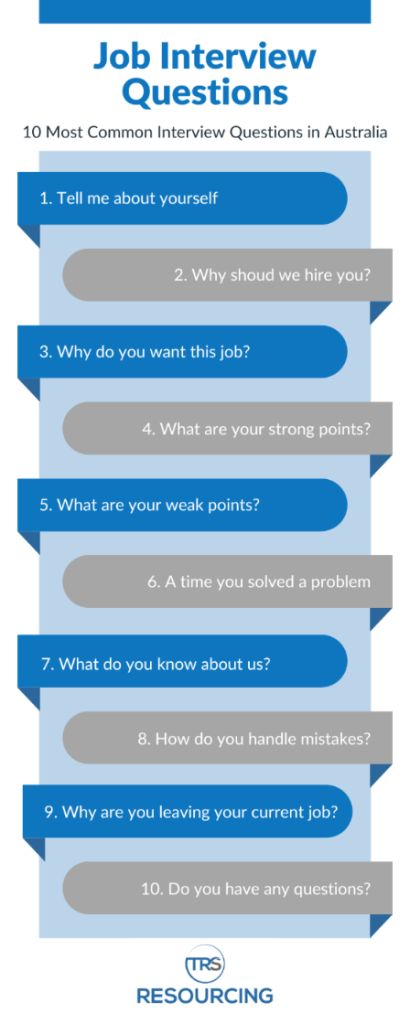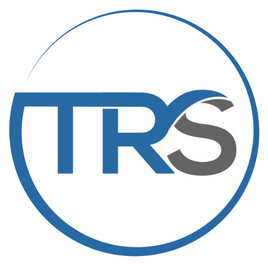10 Most Common Interview Question and Answers in Australia
10 Most Common Interview Questions and Answers in Australia Looking for a job in Australia can be a daunting task, but being prepared for your job interview is a great way to set yourself up for success. At TRS Resourcing, we’ve interviewed hundreds of candidates across Victoria and Western Australia, so we know what works…

10 Most Common Interview Questions and Answers in Australia
Looking for a job in Australia can be a daunting task, but being prepared for your job interview is a great way to set yourself up for success. At TRS Resourcing, we’ve interviewed hundreds of candidates across Victoria and Western Australia, so we know what works and what doesn’t.
Before you start any job, you’ll need to go through the interview process. While this can be daunting, preparing for common interview questions can help you feel more confident and give you the best chance of impressing your potential employer. If you’re prepared with a few answers to common questions and examples of how you’ve excelled in your previous job, you’re less likely to draw a blank when you feel nervous during the interview. By preparing for Australia job interview questions and answers, you’ll be more confident on the day.
“To help you get started, we’ve compiled a list of 10 common job interview questions and answers that you’re likely to encounter in your next interview.”
1. Tell me about yourself

Have you ever Googled ‘what is the best answer for tell me about yourself’? Unfortuntely, there’s no simple right or wrong answer to this question. You are unique, and the culmination of your circumstance and experience gives you something that no-one else has. The key is to focus on what makes you the best candidate for the role. This question gives you an opportunity to briefly summarise the skills, experience and attributes that make you the perfect candidate for the job. Don’t be afraid to add a personal touch as well and let them see who you are. If possible, emphasise only relevant experiences you’ve had that would help you perform in this role; the interviewer doesn’t need to hear about the spelling award you won in grade 5.
2. Why do you want this job?
Your answer to this question should focus on what you can bring to the role and how it aligns with your long-term career goals. This is your chance to demonstrate that you’ve done your research and you understand what the company is looking for. Be specific in your answer and avoid generalities like ‘I need a job’ or ‘I want to earn money’ (even if it’s true).
3. Why should we hire you?
How do you answer why should we hire you? This can be one of the most daunting questions for interviewees as some people find it difficult to talk themselves up. This question is your opportunity to sell yourself and your skills to the employer. Draw on your experience, qualifications and personal attributes to explain why you would be the best candidate for the job. If you can, back up your answer with examples of times when you’ve excelled in a similar role. Remember to express not what the job could do for you, but how you would benefit the company. Refer to the job description and use examples of key skills you’ve built in previous roles that would help you fulfill the requirements.
4. What are your strong points?
This is an opportunity to sell yourself and highlight why you’re the best candidate for the job. Be honest and objective when identifying your strengths, and back up your claims with examples. For instance, if you say you’re a great problem solver, give an example of a time when you identified and solved a problem at work.
5. What are your weak points?
What is a good weakness to say in an interview? Again, this should be unique to you – if you give a cookie-cutter answer the panel will likely see through it. No-one is perfect, and admitting to your weaknesses shows that you’re aware of your own development areas. Conclude this question by communicating a willingness to improve on those points.
6. Tell us about a time when you overcame a challenge/solved a problem at work
This question assesses your ability to identify and solve problems, as well as how you cope under pressure. It’s important to be honest and objective when identifying a time when you overcame a challenge at work – if you give a fabricated answer the panel will likely see through it. Be specific and structure your answer with the STAR method: Situation, Task, Action, Result. This is a great opportunity to show problem-solving skills, so make the most of it and prepare a couple of examples that you will remember on the day.
7. What do you know about our company?
Your answer to this question will show the panel that you’ve taken the time to research their company and understand what they do. This is your opportunity to demonstrate to the hiring manager that you have a genuine interest in working for the organisation and that you would be a valuable addition to their team.
8. Tell me about a time when you made a mistake. How did you handle it?
We all make mistakes, but it’s how we learn from them that counts. Be honest about a time when you made a mistake at work, and explain what you did to rectify the situation. This shows that you’re willing to take responsibility for your actions and learn from your mistakes.
9. Why are you leaving your current job?
Be positive when answering this question. If you’re leaving because you’re looking for a new challenge, or you want to further your career, say so. However, if you’re leaving because you didn’t get along with your boss or you thought the company was unethical, it’s best to avoid criticising your current or previous employer. Stick to the old adage: if you don’t have anything nice to say, don’t say anything at all.
10. Do you have any questions for me?
At the end of the interview, the panel will ask if you have any questions for them. This is your opportunity to find out more about the company and the role, and to clarify any points that you’re unsure about. You may wish to ask about salary expectations if it has not previously been discussed. It’s also a chance to show that you’re interested in the job and that you’ve done your research. The hiring manager may be using this question to gauge how well-researched and engaged you are with the role and company.
Some questions you could ask include:
-
What are the day-to-day responsibilities of the role?
-
What opportunities are there for career progression?
-
What is the company culture like?

Looking for a new job?
TRS Resourcing can help. As one of the leading Recruitment Agencies in Melbourne and Perth, TRS Resourcing can help you land the next big role in your career. We offer white and blue collar labour hire, with access to job openings within many thriving Australian businesses.
Take your job search to the next level with our Career Guide for Job Seekers, including tips on how to write a cover letter and what to wear to an interview.
Find a job today by viewing our Jobs page
To speak with TRS Labour Hire Recruitment Consultants, please contact the following offices:
Labour Hire Melbourne 03 9917 3545

Read more Job Search related articles here!
